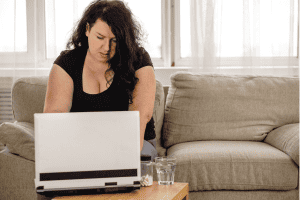5 steps for managing intrusive thoughts
I remember those fleeting thoughts that would creep up out of nowhere and disappear as fast as they came, but would leave an imprint on me for the rest of the day.
Thoughts of letting go of my baby in the bath, or dropping him on the floor. They would shake me to my core. These thoughts can feel terrifying and alienating, as they’re rarely spoken of.
Intrusive thoughts like these are very common among new mothers. In fact, intrusive thoughts in general are common, and are not a given indicator that something is wrong. They can occur for anyone, at any time.
Important note: As you read through this blog, please remember that if you feel like acting on your intrusive thoughts please seek out immediate support. If you find yourself getting stuck on a particular thought, or the emotions that ensue become overwhelming, or they start to impact your behaviours or daily functioning, reach out for support.
What are intrusive thoughts?
Intrusive thoughts are just that – thoughts. It is important to remember that there is a difference between a thought and an action.
To experience intrusive thoughts is to experience sudden, unwanted, scary thoughts that come on without warning and can include both ideas and images that are violent, sexual, bizarre, or socially taboo.
In pregnancy and postpartum, these thoughts often involve the baby.
Types of intrusive thoughts
Some examples of common intrusive thoughts postpartum, include:
- What will happen if I drop the baby from the stairs?
- Should I leave the baby alone in the car for the night?
- Doubting one’s ability to take care of the baby
- Imagining violent things happening to the baby.
How common are intrusive thoughts?
Between 70%-90% of mothers report having intrusive thoughts about infant harm. And, 50% of mothers report having intrusive thoughts related to intentionally harming their baby. Studies have found that having these thoughts does not increase the chances of harmful behaviour.
What causes intrusive thoughts?
Intrusive thoughts are often a reaction to stress, trauma or anxiety. Importantly, they are a symptom of the situation – they don’t define who you are as a person or as a parent
There are a number of factors that may contribute to someone experiencing intrusive thoughts, including:
- Hormonal changes
- Trauma
- Underlying mental health conditions (for example: postpartum depression, anxiety or OCD)
- Potentially a coping mechanism for fatigue as these thoughts keep mothers alert.
Managing intrusive thoughts
- Recognise the thought – acknowledge the thought for what it is – a passing mental event. Try to avoid attaching too much meaning or significance to it.
- Label it as an intrusive thought – this helps to identify it as an unwelcome thought and not a reflection of your character or values.
- Challenge the thought – ask yourself if the thought is realistic or accurate. Is there any evidence to support it? What evidence contradicts it?
- Reframe the thought – replace the intrusive thought with a more positive or neutral one. For example, if you have an intrusive thought about harming your baby, you could reframe it by reminding yourself that you have never acted on such thoughts previously.
- Engage in a mindfulness activity – mindfulness involves paying attention to the present moment without judgement. When you notice an intrusive thought, try to observe it without getting caught up in it.
When to get help for intrusive thoughts
If you can’t escape these disturbing thoughts, or if they’re becoming more than sudden interruptions, or interfering with your day-to-day life, it’s time to seek support.
If the sudden intrusions shift to flowing thoughts of harming your baby or yourself, seek help immediately.
You can seek support from your doctor, 000 in an emergency, as well as other services, including:
Beyond Blue, 24/7: (1300 224 636)
Lifeline, 24/7 (131 114)
Perinatal Anxiety and Depression Australia (PANDA) Helpline, Monday to Friday (9am-7.30pm) (1300 726 306)
For ongoing support, connecting with a trauma-informed perinatal counsellor can provide a safe place to express your thoughts and feelings, without judgement, and access tools and techniques to support you through this time.
If you have been experiencing intrusive thoughts, please remember that while intrusive thoughts can be confronting, most of us have them at some point. You are not alone.
- Intrusive thoughts DO NOT mean you’re a bad mother
- The vast majority of women do experience them
- They are temporary
- Help is available.
If you’re interested in counselling, you can learn more about individual perinatal and trauma counselling here, couples counselling here, or get in touch via the link below. I would love to support you to process your experience of intrusive thoughts.
Fiona xo
Additional reading
Fiona Rogerson: Birth Trauma Counselling – 6 Ways It Can Help
Fiona Rogerson: An Easy Mindfulness Technique for Healthier Thought Patterns















